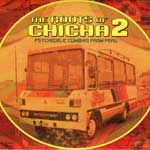Review November 1, 2010
The Roots of Chicha 2
When you see a rose-tinted cover photo of a vintage mini-bus and a subtitle that says ‘Psychedelic Cumbias from Peru,’ you know you are about to have your worldview altered. This album delivers on that unspoken promise. Enter a space and time when life in Lima, Peru, is full of tumult, despair and hope for people leaving behind traditional lives in the Andean highlands and Amazonian forest and to an uncertain future in urban space. The panacea of emotions is reflected both lyrically and sonically on this compilation.
Chicha is a style of Peruvian cumbia as well as the name of an alcoholic beverage of fermented corn, favored from the time of the Incas to this day. It also happens to be a pejorative adjective for the culture and all expressions of the Lima slums. This collection songs spans from the music’s inception in the ‘60s to the early ‘80s; a snapshot at its most viable phase of Peru’s popular culture. The country has since experienced political turmoil as militant groups brought violence into the barrios. All things Chicha became ghettoized, as the upper classes responded with fear and repression during those events. Though this music and its audience have been looked down upon, interest in this style is now seeing a revival in the Peruvian mainstream partly due to the U.S. release of this compilation’s predecessor, and now this one.
Somehow a distinct sound identity is formed in this melding of styles. The list of influences spans the varied history of Peru itself, from folkloric huaynos and criollo sounds to influences throughout the Caribbean, Europe and North America. Songs as distinct as “Paga La Cuenta Sinverguenza” by Manaznita y Su Conjunto illustrate such varied references as an uptempo Polka seemlessly overlain on a tropical cumbia. Other songs like “La Danza del Petrolero” by Los Wembler’s de Iquitos marry cumbia with psychedelic guitar stylings that reference both country-western and surf music. The latter singer narrates a dance for oil dealers and the bitter blessing of its wealth, while the former laments drunken men who pay their bar tab but not their light bill. Either way, this is a fun compilation that reflects both the up and downsides of Peru’s industrial coming of age. As the Olivier Conen notes of the collection, the “silent endurance” of the music sheds light on its underlying positivity.
-Carla Deamant








